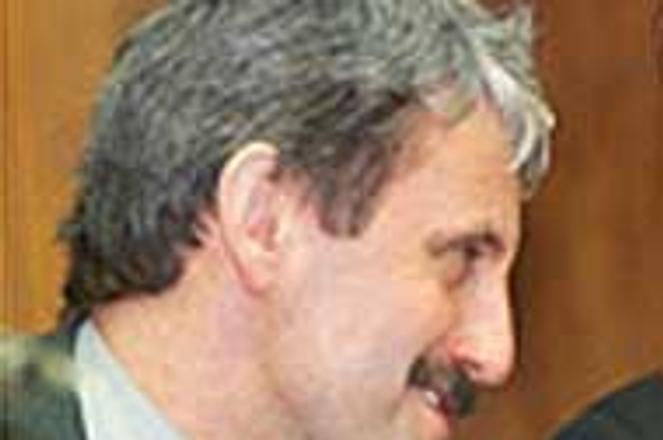Prime Minister Mikuláš Dzurinda (right) impressed European Commission boss Romano Prodi on January 20 with his eagerness to begin talks.photo: TASR
European Commission boss Romano Prodi appeared deeply impressed by Slovakia's committment to EU entry during his visit to Bratislava on January 20. So impressed, in fact, that he compared Slovakia's interest in the number of EU acquis communautaire chapters it would be allowed to begin negotiating to a primal urge. "It seems as if the number of chapters is for Slovaks more important than sex," Prodi joked at a January 20 press conference.
If the tone of Prodi's comments was light, the substance of his message was far more sober. Following the decision of the EU Helsinki summit last December to begin entry negotiations with Slovakia, the Bratislava government had begun to suggest that the EU might begin negotiating as many as 15 chapters in the acquis, an 80,000-page document setting out the changes candidate countries must make before EU entry.
But Prodi, accompanied by EU Enlargement Commissioner Gunter Verheugen, announced that the EU would open no more than five of the acquis' total 30 chapters with Slovakia this February, the same number the union would begin discussing with the other five countries accepted for entry negotiations at the Helsinki summit.
Verheugen said that if Slovakia wants to enter the EU, it has to restructure its banking and industrial sectors, squeeze unemployment figures well below their current 20%, and secure the implementation of European legislation in everyday life.
Slovak officials showed no disappointment following Prodi's announcement. "It isn't a tragedy that we can't open negotiations on 15 chapters. We'll start with five, and if Slovakia will succeed than we can gradually continue," said President Rudolf Schuster after meeting Prodi.
František Šebej, chairman of the parliamentary European Integration Committee, said it might actually help Slovakia to start slowly with the easier chapters so as not to break the momentum of the integration process. "Negotiation of particular issues is very important, because the closing of every chapter means that Slovakia is fully compatible with EU standards in a particular area," Šebej said.
But foreign policy professionals didn't share the equanimity of the country's politicians. Vladimír Bilčík, an analyst with the Slovak Foreign Policy Asociation, said on January 25 that the pace of opening new chapters might be even slower than the government now hoped. "There are two essential problems here," he said. "First, the speed of negotiations will depend not only on the readiness of the individual candidate countries but also on the capacitiy of the EU to negotiate simultaneously with as many as eleven states. Second, even if the EU could proceed faster, it is questionable whether in the next few months Slovakia will be ready to open more than five chapters."
Bilčík explained that in at least two of the chapters the government wanted to open - Telecommunications and Information Technologies, and Culture and Audio-Visual Policy - the country lacked the required legislation. "Slovakia is bound to have serious difficulties in its attempt to catch up with the other Visegrad states already negotiating with the European Union," Bilčík concluded.
On January 24, the EU announced that after it had finished a screening process of the legislation of new candidate countries on February 1, negotiations would begin on five chapters at the ministerial level with all six countries invited at Helsinki. Following the opening of these ministerial talks on February 15, the real negotiation process would start at an ambassadorial level in May.
Although the five chapters are less than the Slovak government claims it can handle, officials say that meeting even this limited target will keep parliament busy. Šebej said the Slovak parliament should approve about 40 bills this year in support of the integration process. Although parliamentary speaker Jozef Migaš has already said he will not allow any more legislation to be passed in accelerated proceedings, Šebej said this would not be a barrier to Slovakia's integration aims. "If the government sticks to its legislature plan for this year, accelerated proceedings won't be necessary," he said. "But we can't have ministries being three or four months late with some bills, as happened so often last year."
While dampening Slovakia's EU enthusiasm, the visting officials did show support and understanding for Prime Minister Dzurinda, who is currently under fire for having divided his SDK party by announcing his intention of forming a new bloc, the SDKÚ. Verheugen told the SITA news agency that Dzurinda had briefed him on his intention to found a new party, and said he was sure it would not threaten the stability of the government.
Given that European integration is one of few areas where Prime Minister Dzurinda has scored a clear success, Bilčík said it was no accident that the Prime Minister was both inviting and receiving comment on domestic political issues. "Opinion polls show that the majority of the population is interested in the basic 'bread and butter' issues such as the cost of living," said Bilčík. "Successful accession talks imply stable, more prosperous and safer conditions in Slovakia. Thus, ultimately, Slovakia's progress toward the standards of the Union may in part determine the attitude of voters toward the present and any future government."


